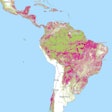So the Trans-Pacific Partnership (TPP) has been in the news quite a bit and since Indonesia just made their first FLEGT shipment, I thought I’d take a quick look at what the TPP might mean for the wood industry.
Overall, the TPP shows a promise to be a force promoting legality and sustainability. There are three major areas that we should consider (abbreviated from this memo considering the TPP from an environmental position):
1. Laws on the Books. TPP countries are required to maintain and effectively enforce their current environmental laws. This specifically targets the concern that a country—particularly a developing country—would weaken their environmental laws and agreements in an effort to encourage more trade and investment.
2. Endangered Species and Wildlife Conservation. TPP takes a series of steps, including levying sanctions and other penalties against individuals or entities engaged in this activity, to combat and prevent the illegal trade of wild flora and fauna.
3. Logging. TPP countries account for about 25% of global timber and pulp production and nearly 75% of the value of global trade in this area. Through TPP and as part of their CITES obligations, countries have committed to fight illegal logging and associated trade as well as promote sustainable forestry.
The TPP is also likely to significantly help the U.S. forest exporters. The ITA created a flyer highlighting key economic benefits, which include the virtual elimination of import taxes on U.S. forest products by Japan, Malaysia, New Zealand and Vietnam. The TPP also looks to ensure that international Sanitary and Phytosanitary measures are “science-based” and “developed and implemented in a transparent, predictable, and non-discriminatory manner.”
The American Forest & Paper Association (AF&PA) favors the TPP. Their press release said that the TPP is likely to lead to “net benefits to American jobs and exporters, many of which use paper and wood products to ship their own commodities, in turn making the TPP a positive for our industry, our supply chains and the economy. Additionally, the report points out that the agreement provides a strong basis for TPP countries to cooperate in fighting illegal logging and associated trade, and in promoting sustainable forest management, all of which we support.”
Is it perfect? Of course not. Some groups oppose the TPP because they feel it is not strong enough in protecting the environment. Others feel that it’s a huge step forward and getting even this far was significant. The TPP has provisions that makes it very similar to a massive international Lacey Act—an illegal environmental action in one country is illegal in another:
One of the most hard-won agreements, according to Jennifer Prescott, an assistant U.S. trade representative who helped negotiate the environment chapter, is the provision that importing countries must combat the trade in any species taken illegally in an origin country, whether the species is protected by law in the destination country or not. If they’re given a credible tip, that is.
This was a new idea for many of the other countries, and it was daunting, too, because it’s open-ended. There’s no list defining the species law enforcement must look for.
Let’s say someone imports a bird to Malaysia that was snatched from the wild illegally in Peru. A Peruvian official, or maybe an NGO on the ground, finds out about the poaching and tells Malaysian law enforcement. Under this provision, Malaysia must go after that as a crime, even if the bird isn’t legally protected in Malaysia.
“It took a lot of effort on [other countries’] part to get their head around the idea of taking on an obligation that went beyond their international commitments and involved, in some form or another, recognizing another country’s laws,” said U.S. Trade Representative Michael Froman.
































